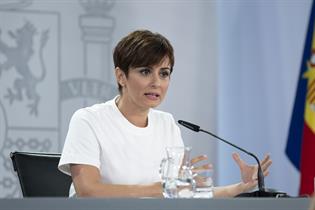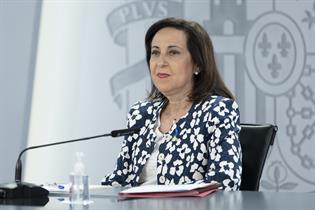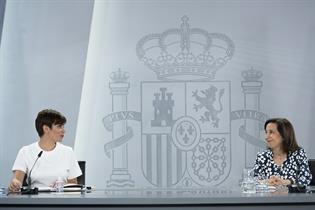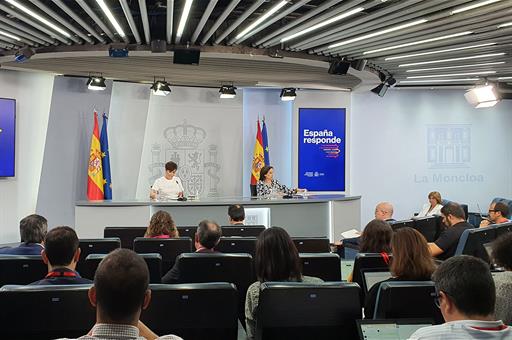Council of Ministers
The Government of Spain launches a line of guarantees to ensure the liquidity of the self-employed workers and companies
Council of Ministers - 2022.5.10
Moncloa Palace, Madrid
The Council of Ministers has approved the characteristics of the first tranche of the Line of Guarantees for Self-Employed Workers and Companies, for a total of €5 billion.
This line, with a maximum amount of €10 billion, supports access to funds for companies affected by increasing energy and raw material costs and is part of the National Response Plan to the Economic and Social Consequences of the War in Ukraine.
The Minister for Territorial Policy and Government Spokesperson, Isabel Rodríguez said that the aim is for companies to be able to keep operating. Rodríguez specified that, for guaranteed amounts of up to €400,000, the guarantee covers up to 80% of the amount of the loan and the term of the financing can be up to ten years.
For larger loans, 80% of the new financing will be guaranteed for self-employed workers and SMEs, and up to 70% for other companies. They will have a repayment period of up to eight years. All companies will be entitled to an initial grace period of 12 months on the loan principal.
 Foto: Pool Moncloa/Borja Puig de la BellacasaIsabel Rodríguez said that the government also set up an exceptional ICO-COVID line to deal with the economic consequences of the pandemic. It financed almost 750,000 companies, mostly SMEs and self-employed workers, and mobilised €14 billion. The sectors that benefited most were transport, food distribution, trade, textiles and fashion.
Foto: Pool Moncloa/Borja Puig de la BellacasaIsabel Rodríguez said that the government also set up an exceptional ICO-COVID line to deal with the economic consequences of the pandemic. It financed almost 750,000 companies, mostly SMEs and self-employed workers, and mobilised €14 billion. The sectors that benefited most were transport, food distribution, trade, textiles and fashion.
The spokeswoman said that behind these figures there are people, households and families who have been able to establish their businesses and stay in employment.
In this context, Rodríguez announced that the Council of Ministers plans to discuss the reduction of electricity bills for households and companies next Friday. Yesterday, the European Commission pre-authorised the proposal submitted by Spain and Portugal and both governments are working to make the necessary adjustments and approve the mechanism in parallel.
Fighting digital fraud
The government has agreed to submit a draft law amending two organic laws and transposing three EU directives on combating fraud and counterfeiting in non-cash means of payment to Parliament.
Isabel Rodríguez said that the Executive decision addresses the new types of cybercrime and organised crime, streamlines legal cooperation between countries with regard to criminal records and establishes the creation of a Register of Minors, which will be operational within a year.
New director of the National Intelligence Centre
 Foto: Pool Moncloa/Borja Puig de la BellacasaThe Council of Ministers has appointed Esperanza Casteleiro Llamazares as the new director of the National Intelligence Centre (CNI), to replace Paz Esteban López.
Foto: Pool Moncloa/Borja Puig de la BellacasaThe Council of Ministers has appointed Esperanza Casteleiro Llamazares as the new director of the National Intelligence Centre (CNI), to replace Paz Esteban López.
The Minister for Defence, Margarita Robles, said that this replacement is "a normal and natural continuation of an official of the CNI by another official of the centre, public servants to the core".
Robles has expressed her absolute confidence in Esperanza Casteleiro, the current Secretary of State for Defence, who has also been director of the minister's cabinet and secretary general of the CNI: "She is a woman that everyone knows for her dedication, her commitment to Spain, to security, to freedom and to the defence industry".
The minister thanked Paz Esteban for her commitment and work during almost 40 years at the CNI, where she has been successively director of the director's technical office, secretary general, acting director and, since February 2020, permanent director since 2010.
Modernisation and reinforcement of the CNI
Robles said she was proud of the 3,000 men and women, civil servants of the CNI, "who work hard every day for our security" and to identify threats such as terrorism, organised crime and cybercrime derived from new technologies.
The minister described cyber espionage, hybrid threats and disinformation as current elements of battle and human rights violations, which not only make people more vulnerable, but influence the progress of wars such as the one in Ukraine.
Robles insisted on the need to modernise and provide the CNI with more resources, to strengthen the defence of peace and freedom and to avoid security failures that could be used by the enemies of democracy: "Those who contravene the Spanish State, and a rule of law that acts by and for the law and with the citizens in mind need to know that things will not be easy for them" she said.
Finally, Robles stressed the importance of collaborating with the international intelligence and defence community, in which Spain is "a serious, secure, reliable and responsible partner". Proof of this reputation, she said, is the fact that NATO has chosen Madrid to host its next summit on 29 and 30 June: "We are making Spain an important international point of reference.
Current Affairs
 Foto: Pool Moncloa/Borja Puig de la BellacasaThe Government spokeswoman reported the results of the analysis of the members of the Council of Ministers' telephones.
Foto: Pool Moncloa/Borja Puig de la BellacasaThe Government spokeswoman reported the results of the analysis of the members of the Council of Ministers' telephones.
After analysing the terminals, the National Cryptologic Centre concluded that three were infected by the Pegasus system: those belonging to the President of the Government of Spain, Pedro Sánchez, the Minister for Defence, Margarita Robles, and the Minister for Home Affairs, Fernando Grande-Marlaska. In addition, there was an attempt to infect the phone of the Minister for Agriculture, Fisheries and Food, Luis Planas, which was unsuccessful.
Rodríguez told the e Executive will make this information available to the justice system in the wake of the complaint it has already filed with the Audiencia Nacional regarding the infection of Sánchez' and Robles' mobile phones.
Non official translation





